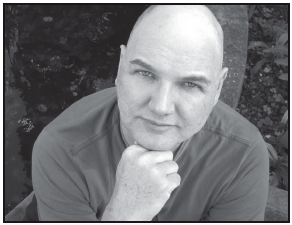BY PAULA ROSENBERG
Recent Chelsea transplant still considers Village home
New School Professor Jackson Taylor moved to New York when he was just 17. The Virginia native, whose debut novel “The Blue Orchard” (Simon and Schuster) was released last week, notes: “I was drawn to the counter culture of the East Village.” That draw led to Jackson residing in the Village or over 25 years. Although he recently moved to Chelsea, he still considers his old neighborhood home. “I love the Village. It formed my identity.”
“The Blue Orchard” is based on the life of Taylor’s grandmother — Verna Krone, a Pennsylvanian who with only an eighth grade education managed to put herself through nursing school and, years later, found herself on trial for assisting a doctor with abortions. Taylor said, “To me, the most compelling thing about the story was that it revolved around a secret. I was 25 when my father revealed the secret of my grandmother and it changed my life. By knowing, I found myself as a writer.”
His novel was a labor of dedication. He worked on it for over 10 years and, during much of that time, was shuttling between New York and Harrisburg, PA to interview over 300 people who were involved with the community at the time. “I wanted the book to pay homage to the people who were willing to tell me the truth. It was astonishing, the impact this small group of people in Harrisburg had on national politics.” A reporter at the time, Taylor put his research skills to use by spending two years reading every issue of Harrisburg newspapers from 1890 through 1960. He chose to write the story as a novel rather than a biography. “I had a desire to fully imagine the world. Anything to do with the trial was truthful.”
Taylor feels even closer to his grandmother after writing her story. “I have a sense of her presence around me because of this book.” He was delighted by the cover of a woman driving through the countryside that was chosen for the novel because it reminded him of a New York memory he shared with her. “We were looking at the American landscape portraits in the MET and she had tears in her eyes. She said that it was exactly how she remembered the farm she used to have. My grandmother would have loved this cover.”
In addition to his own writing, Taylor has been educating and mentoring other writers for years. He teaches workshops at Midtown East’s Mediabistro and helped found the M.F.A. in Creative Writing at The New School over 15 years ago. Currently, he serves as Associate Director for the program.
Taylor’s work as an educator extends well beyond his Union Square classroom. He is also an instructor at The Holy Apostles Soup Kitchen Writers Workshop in Chelsea. The program was founded by writer Ian Frazier and has been serving the community ever spring since its inception in 1995. Taylor, along with other instructors and volunteers, provides the participants with paper, pencils and writing prompts. The majority of the participants are homeless. The program concludes with a public reading where participants are encourages to share some of their work. Some past participants’ work has gone on to be published. “It is an amazing place.”
Taylor’s love of writing and education is also extended to men and women who are currently in prison. He has been the director of the Prison Writing Program at PEN American Center for over 20 years. He wrote “The Handbook for Writers in Prison” and it is free to anyone in jail who requests it. The program has a mentorship component where over 100 authors correspond with their designated mentee over the course of a year.
Noting the change in other aspects of life that comes from tapping into one’s creativity, Taylor says “Writing is a skill that generates other skills. Skills may be the only form of legitimate power.” He is modest about his involvement with both programs. “I don’t think I’m doing anything that anybody can’t do.” He also sees his contribution as rewarding. “You get to see miracles.”
It was that essence of grassroots work that drew Taylor to New York. Even though his original neighborhood has changed over the past 30 year, he observes: “That spirit is still connected to the East Village.” There are some changes that he does lament. “We lost St. Mark’s Cinema, Jillian’s Billiards and the Palladium.” Taylor keeps a photograph of St. Mark’s Cinema that dates back to the 1910s. “It was amazing that we could still see movies there up through the 80s. Then, we lost it to a GAP.” He does miss the edge the neighborhood had when he first moved to the city. “It was gritty and full of urban decay and stories. As a writer I loved that. New York saved my life in many ways.”
Although disappointed with some of the changes to the city over the years he recognizes that “New York is about changes and you have to embrace them.” Some of his favorite haunts have survived gentrification. He still enjoys Katz’s Deli on the Lower East Side and Second Avenue Deli (even though its location has changed). “The Strand Bookstore is amazing and I still go to the used bicycle store on 12th Street [Bikes By George] when I am having problems with my bike.”
Whether walking through Chelsea or returning to his old Village haunts, Taylor says that cultural stability trumps the inevitable physical changes in these two neighborhoods: “New York is a great university. I never stop learning in the city.”
Jackson Taylor has upcoming book events on Thursday, January 21st, 7:30 p.m., at Pete’s Candy Store (709 Lorimer Street, Williamsburg, Brooklyn; free admission) and on Monday, February 1st, 6:30 p.m., at The New School (66 W. 12th Street Room. 510; 5.00 admission; e-mail boxoffice@newschool.edu for reservations).




























